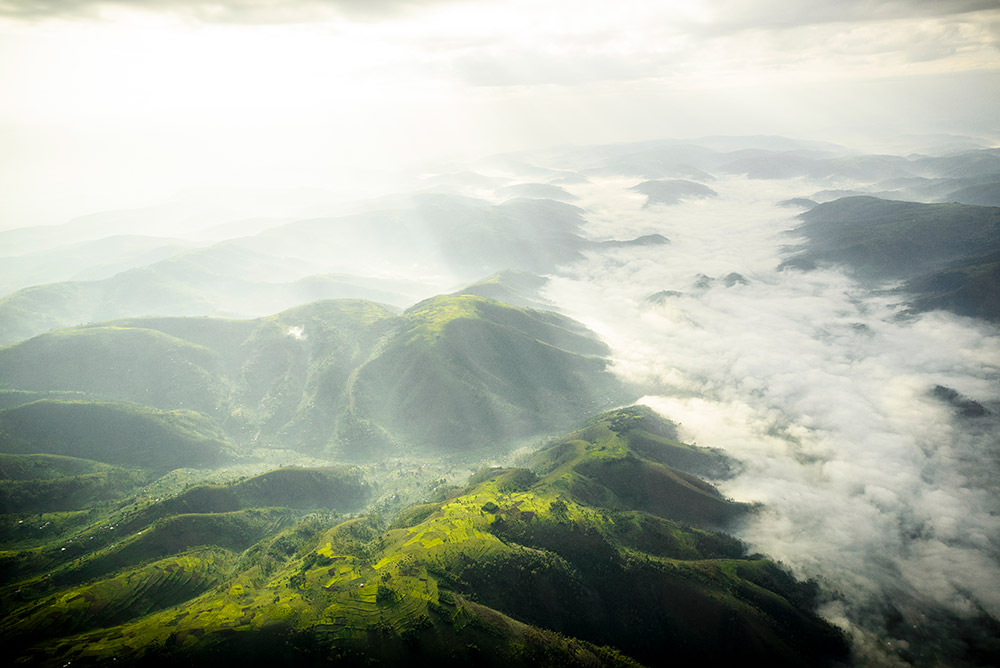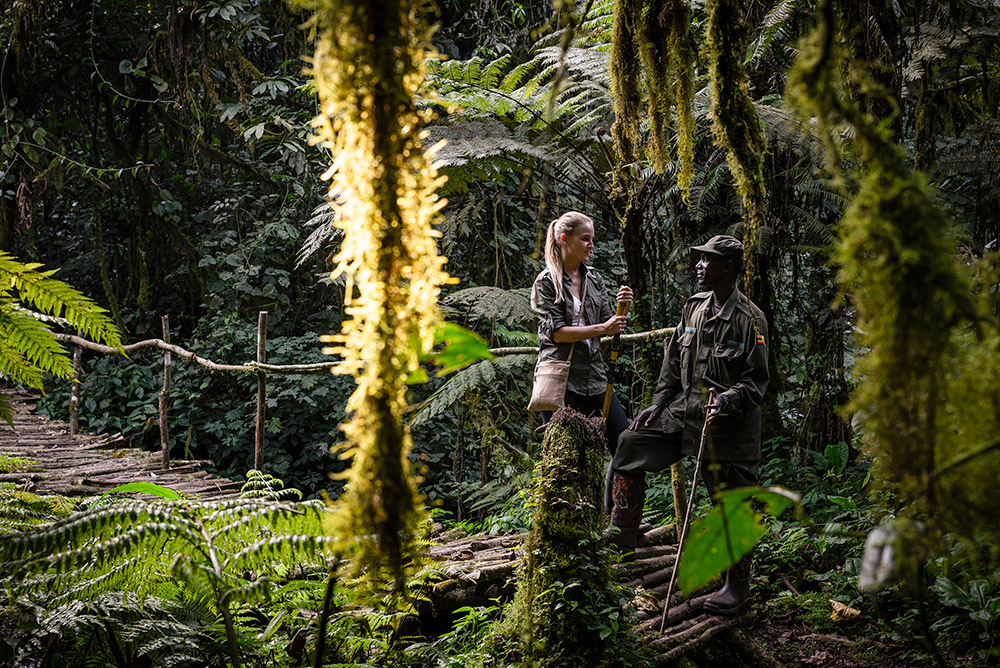Bwindi Impenetrable Forest
There are few names as enticing as Bwindi Impenetrable Forest. The word Bwindi means “darkness”, and once you enter these dense, age-old woodlands, you’ll be swept away by a sense of awe and wonder.
Located in South-Western Uganda, Bwindi Impenetrable Forest spans 32,000ha (331km2) and is one of Uganda’s oldest rainforests. It’s estimated to be over 25 000 years old! In 1994, it was declared a UNESCO Natural World Heritage Site and when you enter this realm, it’s easy to understand why. Home to more than 160 species of trees and over 100 species of ferns, it’s rich biodiversity accommodates many endangered species. Including, of course, the critically endangered Mountain Gorilla.
Thought to be a remnant of a much larger forest which is said to have spanned Western Uganda, Rwanda, Burundi and Eastern DRC, the rainforest is considered to be the most vital forest in Africa for montane forest butterflies. In fact, over 202 species flutter between her foliage. At last count, more than 347 species of birds flourish within the forest.
In addition to the main attraction – the mountain gorillas – Bwindi is also a natural habitat for the Black and White Colobus monkey, chimpanzees, L’Hoest’s monkeys, and African elephant.

Sanctuary Retreats Gorilla Forest Camp
Gorilla Trekking in Bwindi Impenetrable Forest
Bwindi Impenetrable Forest is home to almost half of the entire population of the critically endangered mountain gorilla, making it a premier destination for gorilla trekking.
Roughly 340 mountain gorillas make up seventeen mountain gorilla families. Each family is trekked by a small group of only 6-8 tourists per day. The gorillas forage between the trees and misty mountain slopes of Bwindi, and visitors should be prepared for an early start. It can take anything between 1-8 hours to track a troop, depending on how the gorillas decide to navigate nature on that particular day.
Encounters with Bwindi’s Mountain Gorillas are strictly regulated. The gorillas are fiercely protected and are exposed to only one hour in the presence of humans per day. This is done to protect the gorillas and prevent habituation. The danger of habituation means that the gorillas become fearless of humans. This poses various risks, including making them vulnerable to poachers. Habituation also makes them more inclined to venture outside the park to raid crops which in turn causes human-animal conflict. Increased human-exposure also makes them more susceptible to transmission of human diseases. Unfortunately, already 10 of the known 36 groups had been habituated by 2012.
Although gorilla trekking can be done all year around in Uganda, Bwindi Gorilla trekking is best experienced during the dry season as rainy conditions can make the terrain tricky to traverse. The best time to go is during the months of June, July, August, September and December. In true Africa style, temperatures in Bwindi can range from 11°C/52°F in the morning and 23°C/73°F in the afternoon. Tourism numbers to Bwindi are relatively low compared with Rwanda, and the reduced cost of their permit makes it a slightly more economical gorilla-trekking destination.

Sanctuary Retreats Gorilla Forest Camp
The Batwa People
The Batwa hail from a long line of ancient forest dwellers. Bearing the honourable title of “The Keepers of the Forest”, they’re sometimes referred to as pygmies, and they carry with them a rich history.
Small in stature and tall in resourcefulness, the Batwa are said to have existed for more than 60 000 years. Sustained by small game, plants and fruits of the forest, they lived in harmony with nature for millennia. Their huts, made from leaves and branches, blended in seamlessly with the surrounding jungle.
In 1992, action was taken by the government to conserve The Impenetrable Forest, including the endangered species within her borders. Tragically, the Batwa were forced out and lived as “forest refugees.” Many Batwa perished during their early years of exile.
The remaining Batwa have managed to retain their hunter-gatherer skills and great effort has been made to preserve and demonstrate their cultural practices and traditional dances.
Buhoma Community Tours take visitors to Bwindi’s neighbouring Batwa community. Here, the Batwa use song and dance to express stories of their former life in the forest.
Buhoma overlooks the forested hillsides of Bwindi, which creates a mystical backdrop for a cultural tour. The three-hour village walking tour normally begins with a visit to the handcraft shop. Here, visitors will see handmade local artefacts such as wood carvings, fabrics, beeswax candles and jewellery – all made by local artisans. You may meet a traditional healer who will explain how natural, age-old remedies are used to treat the sick. A tour of a local village would not be compete without a short demonstration of how bananas are used to make juice, beer and gin.
Bwindi Community Hospital
A visit to Bwindi should include a visit to the Bwindi Community Hospital. While this may seem like an unlikely tourist attraction, it stands as a beacon of hope and healing for the surrounding communities.
Founded by U.S missionaries Dr. Scott and his wife Carol Kellerman in 2003, the hospital began as a humble outreach clinic. Here, under a giant fig tree, Batwa pygmies who were evicted from the Impenetrable forest, were treated for various ailments.
Before long, the medical team realised that their outreach clinic needed to extend to the rest of the general population. After all, many of the health issues affecting the Batwa were also affecting other ethnicities. The first task at hand was to educate local communities about malaria, and issue mosquito nets.
In response to increased need, the clinic grew into a fully-fledged hospital. Now staffed by a team of 121 health workers and support staff, the Bwindi Community Hospital cares for more than 120,000 people who reside within the South Western corner of Uganda.
Founded under the Diocese of Kinkiizi, Church of Uganda, the core values of the hospital are holistic and Christ centred. Research and Innovation, Community Orientation, Collaboration and Excellence are all cornerstones of the BCH.
The Uganda Nursing School and Uganda College of Health Sciences Bwindi also grew out of the expansion of BCH. Together they provide a steady stream of healthcare-workers who boost the Ugandan health professionals workforce.








